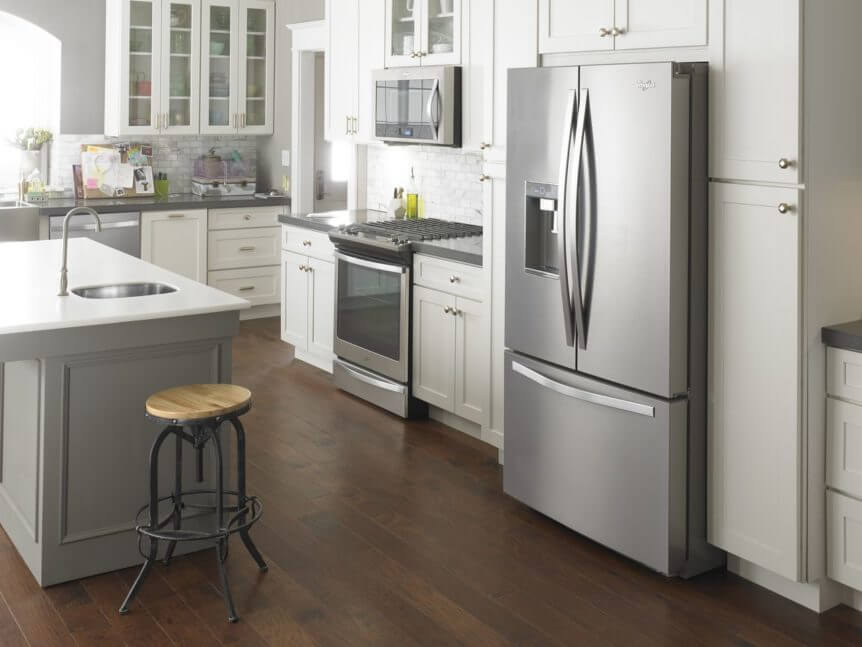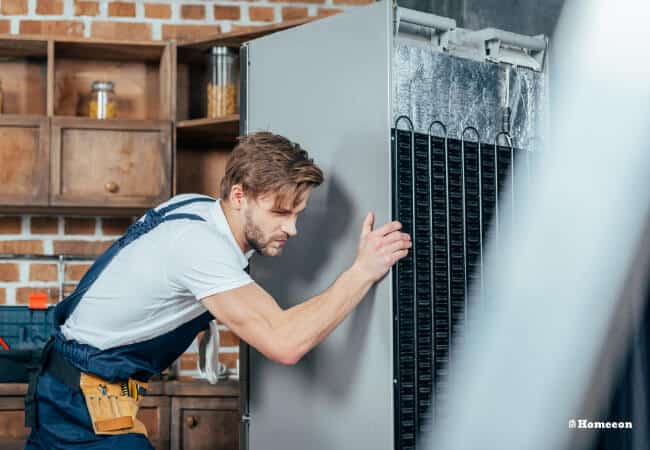Last Updated on August 16, 2023 By Emma W. Thomas
The exterior of a refrigerator can feel hot due to the condenser coils located at the back or bottom of the appliance. These coils release heat as part of the cooling process. It’s normal for them to become warm while the fridge operates, ensuring efficient cooling.
Why is the Outside of My Refrigerator Hot?
A hot-running refrigerator can be quite alarming, but various reasons can cause this heating up, from minor part malfunctions to significant component failures. Understanding these reasons is beneficial to address the concern at an early stage. Here are some factors that can offer a clear understanding:
- Condenser CoilsThe condenser coils on the rear or bottom of the refrigerator are designed to dissipate heat as refrigerant passes through them. If these coils become covered in dust, they cannot efficiently release heat, causing the refrigerator to work harder, leading to the outer surface becoming hot.
- Fan MalfunctionIf the condenser fan next to the coil fails, it will not be able to cool down the refrigerant before it flows over the condenser coils, leading to excessive heat generation.
- OverstuffingA very loaded fridge can block air circulation, causing overwork of the compressors as they strive to keep all the contents cold. As a result, more heat is emitted.
- Frequent Door OpeningEach time the refrigerator door is opened, it allows warm air inside, making the appliance work harder to restore cold temperatures, hence producing excess heat.
- Poor VentilationIf not positioned correctly with appropriate spaces on each side, the back, and above, a fridge cannot vent off heat properly leading to a warmer exterior.
- Faulty GasketsIf the door gaskets or seals are defective or worn out, they allow cool air to escape from inside, causing more work for the compressor, therefore, increasing heat on its exterior.
Each of these explanations can be the potential answer to the question “Why is the Outside of My Refrigerator Hot?” It’s crucial to monitor your refrigerator’s functioning to catch any such problems early on and maintain its longevity.
How to Protect Your Refrigerator from Outside

To protect your fridge from the outside, clean the inside thoroughly with water and soap. You can avoid covering the outside of your appliance, which may allow the accumulation of moisture to damage it. You can also apply a coat of stainless steel
finish to protect the exterior.
Why Air Around A Refrigerator Is Warm
The automatic energy-saver system circulates warm fluid around the front part of the freezer compartment creating natural warmth. This warmth helps to prevent condensation on the outer part of the fridge, especially when the weather is hot and humid. The area outside the fridge remains warm, and it can sometimes be hot if the compressor runs longer than usual.
You can regularly clean off the condenser coils to improve airflow around your appliance, as this will help relieve the issue.
Some freezer models have a switch in the fridge compartment that is marked power/energy saver. You can use this switch to control the heater found behind the strip between doors. When climate conditions are humid and hot, or when you see moisture between doors, set the switch to the right.
What Causes Your Refrigerator to Be Too Hot to Touch
A normal functioning fridge can feel warm from time to time, but if you notice that it is getting abnormally warm or hot to the touch, this could indicate a problem.
The following are some causes:
- If the Condenser Tubing is Dirty
Most new refrigerator models have condenser tubing that lines the cabinet edges. This; l pipe serves the same function as a heater to minimize and guard against moisture build-up. When the tube gets dirty, it may run hot. You may feel the heat if you reach your hand from the cabinet’s edge where the tubing is.
- If Condenser Coils are Dirty
Dirty condenser coils and poorly performing condenser cooling fans can make your refrigerator feel hot. Ensure that you clean the coils by following the instructions in the manual of your refrigerator. You can also consult a fridge repair specialist if you need assistance.
Unplug the appliance before you embark on cleaning the coils.
- When Electric Heater is Turned on
Some old refrigerator models are equipped with electric heaters meant to stop moisture from forming and spoiling the food inside the appliance during humid and hot days.
The heater’s location at the edge of the cabinet sometimes makes the refrigerator door slightly hot when the heater is on. You can switch off the fridge when you notice the temperatures are rising.
- When the Appliance Runs Continuously
If your fridge runs continuously to cool the contents inside or you are opening and closing the door consistently, this can make it feel hot than normal. If the temperatures outside are humid and hot, the fridge can run longer to cool the food and become warm.
Filling the refrigerator with fresh food also causes it to run for a longer period to cool the contents; thus, it will feel warmer.
Is it Okay to Place a Refrigerator Outside?

You do not have to limit your fridge to inside the house only as you can use it for an outdoor camp, a cabin, or in the backyard to suit your needs.
The refrigerator will use more energy while outside, but you can observe some caution:
- Using a Portable Generator
Using a fridge for campsites or other places that you do not visit frequently will need you to have a portable generator as it is a suitable option. Although the cost per unit is slightly higher than when you use electricity, it is okay since you won’t use it constantly. If you want to move your fridge outside permanently, you can put it near a power outlet or a heavy-duty extension cord with no risk of burning up or blowing a fuse.
- Maintenance
When you use your refrigerator outside, it gets exposed to elements such as dust. You will need to regularly clean the area around the fridge pump more and give the appliance a little more maintenance. You should not allow debris and dust to build up since they can shorten your device’s life. Ensure that the refrigerator remains dry to prevent rust that may damage it and place it on blocks if there is flooding to avoid electrical hazards.
- Protection Against Extreme Weather
Ordinary fridges may cease to function or get damaged in extremely low temperatures. If the temperatures go below zero degrees Fahrenheit consistently, you should turn off the appliance, move it inside or wrap it with insulation.
In case of strong winds, you need to place the back of your fridge against a solid surface to protect the coils and compressor from flying debris. Avoid locations that are excessively humid or consistently dry and cold as this can break up the gaskets and seals between the doors.
- Observe Efficiency
It would be best if you tried to be efficient in terms of energy consumption when using your appliance outside. Turn the temperature to the lowest, comfortable setting, and place the device away from direct sunlight to prevent the cooling element from fighting against the sun for it to remain cold. You can also turn off the fridge when not in use, as it will not take long to start cooling when you need it.
- Use Outdoor Refrigerators
You can purchase a quality refrigerator that can run efficiently outside. Outdoor fridges have durable materials, energy-efficient design, and they come in different sizes and styles. Although these appliances may cost more than regular refrigerators, they can withstand elements and last longer.
Final Word
Though it may be normal for your fridge to feel warm on the outside, it is advisable to check for the causes and rectify any problems if it feels warmer than usual. Ensure that the condenser coils and tubes are clean to prevent overheating.
You can also use your appliance outside the house but ensure that you observe the necessary precautions to avoid damaging or consuming too much energy.
References:
https://www.hunker.com/13409728/what-causes-a-refrigerator-to-be-hot-to-the-touch
https://101appliance.com/why-are-the-sides-of-my-refrigerator-hot/
Emma is a graduate of Domestic Science or Family and Consumer Sciences (Home Economics) from the University of Wisconsin. She has 7 years of experience Working with the strategic section of BestBuy and now writing full-time for Homeeon.
From Managing the Home, Interiors, Cleaning, and Exteriors to Gardening and everything about Making A Home Liveable – is her passion and this Homeeon is the result of this.
Emma loves decorating her home with the best stuff found online. She cares about quality over anything and writes reviews about them here in Homeeon. Get in touch with her over Pinterest.
Keep reading her blogs.
